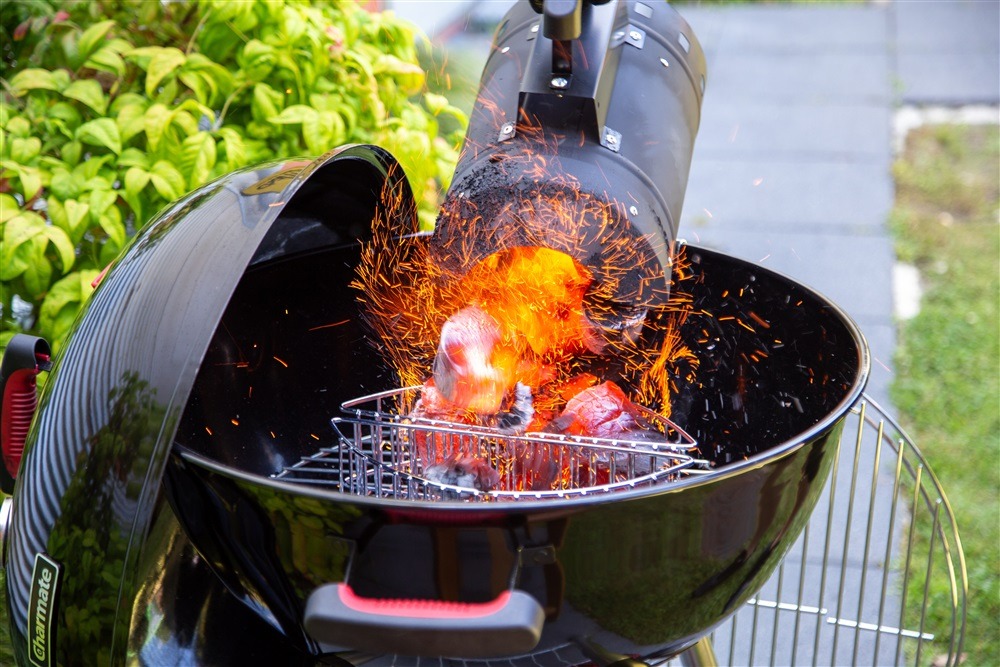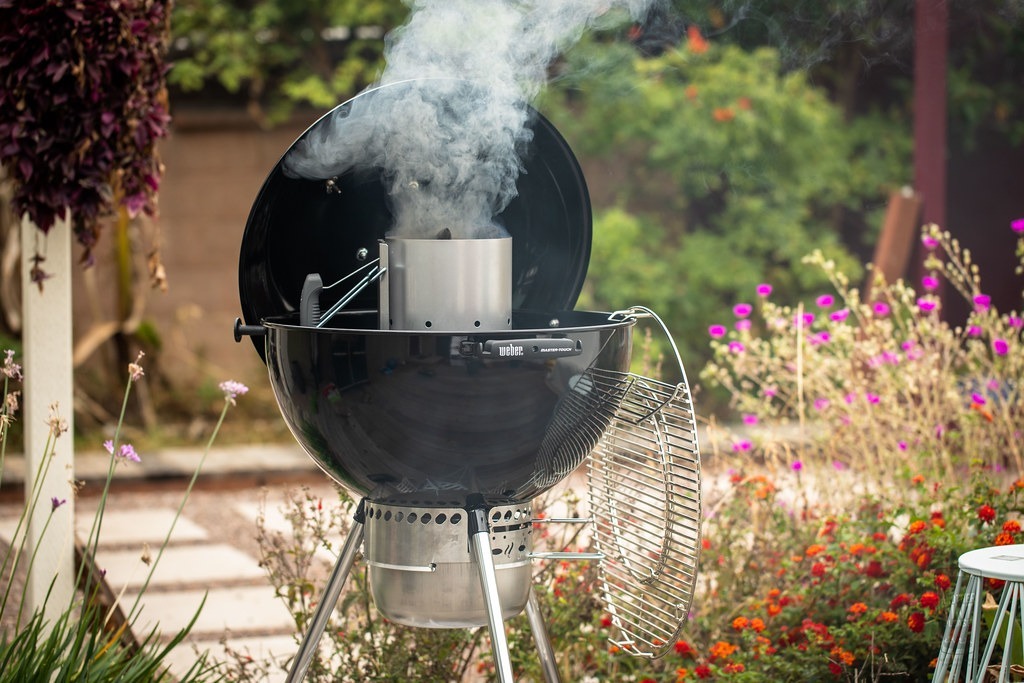Ahh, there’s something magical about the aroma of charcoal grilling wafting through the air, isn’t there? But have you ever wondered how to achieve that perfect charcoal glow without the hassle?
Nothing beats the flavor of a charcoal-grilled steak or burger, but getting the grill going can be a hassle if you don’t know how to do it correctly. One of the easiest and most efficient methods for starting a charcoal grill is by using a chimney starter.

Understanding the Chimney Starter
Let’s kick things off by understanding what exactly a chimney starter is. Picture this: a tall, cylindrical metal tube with holes at the bottom and a handle on the side. It’s your ticket to faster, more efficient charcoal ignition. And trust me, once you start using it, you’ll wonder how you ever grilled without it.
Now, why bother with a chimney starter when you can simply light your charcoal the old-fashioned way? Well, my friend, the advantages are plenty. From quicker ignition times to more even heat distribution, it’s a game-changer in the world of charcoal grilling. Plus, it’s incredibly easy to use.
Preparing Your Charcoal
Before we dive into the nitty-gritty of starting your grill, let’s talk charcoal. Not all charcoal is created equal, and choosing the right kind can make all the difference in your grilling experience. Opt for high-quality charcoal like Kingsford Original Charcoal for consistent results and that classic charcoal flavor we all know and love.
But hold your horses, cowboy. Before you go dumping charcoal into your chimney willy-nilly, let’s talk quantity. Too much charcoal and you’ll end up with a blazing inferno. Too little and you’ll struggle to get your grill up to temperature. Fear not, we’ll walk you through the process of calculating the perfect amount of charcoal for your grilling needs.

Credit: www.rvtravel.com
Step-by-step guide to starting a charcoal grill with a chimney starter
Choose The Right Charcoal
When choosing charcoal for your grill, it’s essential to select one that is made of high-quality materials, such as hardwood lump charcoal. Avoid using charcoal that contains additives or chemicals, as they can affect the flavor of your food.
Load The Chimney Starter
Fill the chimney starter with briquettes or lumps of charcoal. Fill it about three-quarters of the way up, leaving room at the top for air to flow.
Add Newspaper
Crumple a few sheets of newspaper and place them in the bottom of the chimney starter. The newspaper will act as a wick to light the charcoal. Be sure to use plain newsprint with no ink or colored paper, as they can produce harmful fumes during burning.
Light The Newspaper
Light the newspaper from the bottom of the chimney starter. Be sure to wear heat-resistant gloves when handling the chimney, and use a long lighter or matches to avoid getting burned.
Wait For The Coals To Ash Over
Allow the charcoal to burn for about 15-20 minutes until the coals are ashed over. You’ll know the coals are ready when they are gray or white and glowing.
Pour The Coals
Using heat-resistant gloves, carefully pour the hot coals into the bottom of the grill. Spread them out evenly using a long-handled spatula or tongs.
Add The Grates And Start Grilling
Once the coals are spread out, add the grates to the grill. Allow them to heat up for a few minutes, then add your food. Remember to keep the lid on the grill as much as possible to maintain the internal temperature and prevent flare-ups.
Tips for using a chimney starter
- Be sure to place the chimney starter on a heat-resistant surface, such as a concrete patio or grill mat.
- Use a long lighter or matches to light the newspaper from the bottom of the chimney starter.
- Avoid using lighter fluid or other accelerants, as they can affect the flavor of your food and produce harmful fumes.
- Consider using a charcoal chimney starter with a larger capacity if you’re grilling for a crowd.
- Don’t overcrowd the grill grates, as this can cause uneven cooking and flare-ups.
Allow your food to rest for a few minutes after grilling to allow the juices to redistribute and ensure a tender and flavorful meal.
Troubleshooting Common Issues
Here are some tips and tricks for troubleshooting common grilling issues like a pro:
Excessive Smoke
- Check the airflow: Ensure that the vents on your grill are properly adjusted to allow for optimal airflow. Adjust them as needed to regulate the oxygen supply to the coals.
- Clean the grill: Built-up grease and food residue can contribute to excessive smoke. Give your grill a thorough cleaning before each use to prevent this issue.
- Use the right charcoal: Low-quality charcoal or charcoal that’s too damp can produce more smoke than necessary. Opt for high-quality, dry charcoal for a cleaner burn.
Uneven Heat Distribution
- Arrange the charcoal evenly: When loading your chimney starter, distribute the charcoal evenly to promote uniform heat distribution.
- Rotate the grill grate: If you notice hot spots or cool zones on your grill, rotate the grate periodically during cooking to ensure even cooking.
- Use a two-zone fire: Create two heat zones on your grill by placing the charcoal on one side only. This allows for both direct and indirect cooking, giving you more control over the heat distribution.
Difficulty Maintaining Temperature
- Monitor the airflow: Adjust the vents on your grill to regulate the airflow and maintain the desired temperature. Opening them wider increases oxygen flow, while closing them restricts it.
- Add more charcoal: If the temperature starts to drop, add a few more lit charcoal briquettes to the grill to boost the heat.
- Preheat the grill: Ensure that your grill is properly preheated before adding food. A preheated grill helps maintain a steady cooking temperature throughout the cooking process.
Charcoal Not Igniting Properly
- Use a chimney starter correctly: Ensure that you’re following the proper procedures for loading and lighting the chimney starter. Properly arranged charcoal and adequate airflow are essential for successful ignition.
- Use lighter cubes or newspaper: If you’re having trouble getting the charcoal to light, try using lighter cubes or crumpled newspaper to ignite the coals more effectively.
- Allow more time for heating: Sometimes, charcoal may take longer to heat up, especially if it’s damp or if there’s a lack of airflow. Be patient and give it a little extra time to heat up before adding food to the grill.
Frequently Asked Questions Of How To Start A Charcoal Grill With Chimney
How Much Charcoal Should I Use?
Use at least 50 briquettes for small grills and up to 100 for large ones.
How Long Does It Take To Heat Up?
It should take between 20-30 minutes until the charcoal is glowing and hot.
How Do I Properly Light The Charcoal?
Using a chimney starter with kindling, newspaper or lighter cubes is the most efficient way.
How Do I Position The Grill Grates?
Place the cooking grate on top of the charcoal grate before lighting the charcoal.